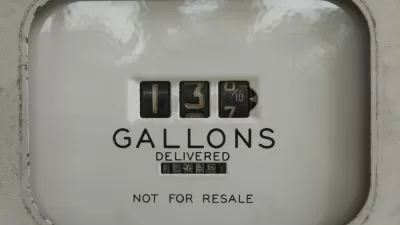If Republican Governor Terry Branstad signs the bi-partisan bill as signs indicate, the increase will be the most significant state transportation funding legislation since Republican Gov. Matt Mead of Wyoming signed a 10-cent increase two years ago.
Mark Tauscheck of KCCI Des Moines gives the vote count for each house of the state's General Assembly on Feb. 24: "The Senate voted 28-21 in favor of the bill on Tuesday about noon. The House passed SF 257 in a vote of 53-46 about 1:50 p.m."
The legislature now needs to 'finalize' the bill, after which it will be sent to the governor's office who has three days to act. While Branstad has only said that he "will carefully review the bill in its final form before announcing a final decision," Tauscheck writes that House Transportation Committee Chair Josh Byrnes told him that he "is expected to sign the measure."
If signed, the Hawkeye State's state 22.5-cents per gallon tax (19-cents per gallon for ethanol blended gas), last raised in 1989, will increase by a dime as early as March 1.
As of Jan. 1, the gas tax was the 36th highest in the nation according to the American Petroleum Institute [PDF]. The average gas tax in the United States on January 1 was 27.66 cents. The state would possibly have the 13th highest on March 1.
Recent History of the Bills, Including "Highly Unusual Move" in House.
The bills squeaked by two key committees in the split-control legislature with help from Republican House leadership in a most unusual move on Thursday, February 19. Democrats are the majority in the Senate—Republicans in the House.
In the Senate Ways and Means Committee, it was "approved on an 8-6 vote," wrote William Petroski and Brianne Pfannenstiel on February 20 in The Des Moines Register. In the House Ways and Means Committee it "advanced on a 13-12 vote." Two members who opposed the tax were replaced with supporters by Republican House Speaker Kraig Paulsen in advance of the vote in what the reporters call an "uncommon move to ensure the outcome."
After that vote, the editors of Bloomberg news opined, "A political development of actual importance is occurring in Iowa this month: Democrats and Republicans are proposing to increase the state’s gas tax."
Members of both parties have good reason to support it: More than 1 in 4 of the state’s major roads are in poor condition [PDF], and an equal proportion of its bridges is structurally deficient or functionally obsolete.
"Gov. Terry Branstad on Monday gave a strong signal that he would approve a 10-cent per-gallon increase in the state’s gas tax if the split-control Legislature can get a bipartisan agreement to his desk that would generate $215 million annually to address critical road and bridge improvements," wrote Rod Boshart for KCRG ABC News on February 16.
"For a person who drives 15,000 miles per year in a vehicle that gets 25 miles per gallon, the proposed tax increase would cost $60 annually," note the Register reporters, similar to the flat $50 registration fee proposed by Calif. Assembly Speaker Toni Atkins posted here Friday.
However, unlike Iowa, where tax increases need pass with only a majority vote ("26 votes in the Senate and 51 in the House," according to an email by William Petroski), California tax increase legislation requires passage by a supermajority of two-thirds.
Branstad has changed his attitude toward gas taxes since June 2013, when he indicated that "(t)ax cuts, not increases, are on his agenda". Low gas prices played a key role, as it did with other governors, as noted last month.
Hat tip to AASHTO Journal.
Correspondent's note: An excellent discussion on paying for transportation improvements as it relates to this legislation can be found on a Feb. 6 Iowa Press video, featuring the legislative advocates, the press asking questions, and a bill opponent.
FULL STORY: Gas tax increase just passed both Senate, House

Planetizen Federal Action Tracker
A weekly monitor of how Trump’s orders and actions are impacting planners and planning in America.

Congressman Proposes Bill to Rename DC Metro “Trump Train”
The Make Autorail Great Again Act would withhold federal funding to the system until the Washington Metropolitan Area Transit Authority (WMATA), rebrands as the Washington Metropolitan Authority for Greater Access (WMAGA).

The Simple Legislative Tool Transforming Vacant Downtowns
In California, Michigan and Georgia, an easy win is bringing dollars — and delight — back to city centers.

The States Losing Rural Delivery Rooms at an Alarming Pace
In some states, as few as 9% of rural hospitals still deliver babies. As a result, rising pre-term births, no adequate pre-term care and "harrowing" close calls are a growing reality.

The Small South Asian Republic Going all in on EVs
Thanks to one simple policy change less than five years ago, 65% of new cars in this Himalayan country are now electric.

DC Backpedals on Bike Lane Protection, Swaps Barriers for Paint
Citing aesthetic concerns, the city is removing the concrete barriers and flexposts that once separated Arizona Avenue cyclists from motor vehicles.
Urban Design for Planners 1: Software Tools
This six-course series explores essential urban design concepts using open source software and equips planners with the tools they need to participate fully in the urban design process.
Planning for Universal Design
Learn the tools for implementing Universal Design in planning regulations.
Smith Gee Studio
City of Charlotte
City of Camden Redevelopment Agency
City of Astoria
Transportation Research & Education Center (TREC) at Portland State University
US High Speed Rail Association
City of Camden Redevelopment Agency
Municipality of Princeton (NJ)



























